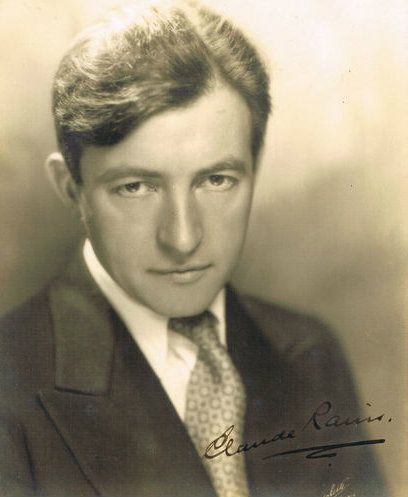I just read An Actor's Voice: Claude Rains (University Press of Kentucky) by David J. Skal with Jessica Rains.
Claude Rains was destined to rebel and did so, becoming a truant when he was ten or so. He was born in 1898 to a testy, i.e., alcoholic and belt-wielding father who overpowered his mother. And who was a braggart unable to feed the family. They lived in poor, as opposed to gentrified, London.
He quit school, worked here and there, ending up (a story in itself) in theaters where he assisted the great great actors of the day, like Sir Herbert Beerbohn Tree. Long, long days, and most of his pay went to help his family, but eventually, the great, great actors began to mentor Rains, coaching him to lose his stammer, and with diction in general. He was given novels and plays to read and assigned parts to memorize to help as a prompter. This led to that and Rains developed into a great stage actor, who went on tour, and also taught at the Royal Academy. Gielgud was a student, as was Charles Laughton.
Difficult marriages, service in the British military in wartime, this that, and he moved to the U.S. where he also toured and acted on Broadway. Then Hollywood, with The Invisible Man.
Gielgud was always kind, Laughton became a mean prick. G.B. Shaw sly but generous. Bette Davis very dear and warm, but wanted to run the show. And on and on, with the studios being their usual off-again on-again using lying entities, at least some of the time. Rains was not a temperamental actor. So there's that. He was married six times. So there's that. And there's greatness. That.
Friday, May 24, 2013
Monday, May 20, 2013
Sibyl James' "October Lambs" "in suburban Carthage" {a prose poem}
|
Tuesday, May 14, 2013
Camille Martin's LOOMS: strolling down a parallel road
Overly dramatic? Not when it's about poetry, in this case, Camille Martin's Looms, which like Penelope's famous twenty-year woven prevarication while Odysseus is out and about, begins each day anew with each poem, each poem begun without fanfare and needing none.
What it is: there are no titles and without titles, I initially was unmoored and a little ashamed I needed the perfunctory "To a Skylark" or "Homage to My Hips" to orient me. But then I got with the agenda gloriously so - allowed myself to float, to be shuttled (but not shuttlecocked) from perspective to image and on, each sonnet a frame and yet an embrace, a scene and invitation.
Martin launches the collection with a quotation from Barbara Guest: Its remoteness from the center of things is what is endearing about a Tale and it doesn't tell the truth about itself. It tells us what it dreams about. Ah!
I recommend you get hold of Looms (published by Shearsman Books, publisher of Mervyn Taylor, Janet Holmes, Tom Clark, and a long, long list of other terrific poets). Here's why (from page 36):
Between grass and vacuum, standing on faded
tapestry in a low cloud, the odd pine cone skittering down
a roof. Some burgeoning belief poses-index finger raised-
and then that becomes life strolling down a parallel road
beneath a gentle sky, a cruel sky, Consoling
to think of burning ballast for light, brewing letters from ashes
moistened with a little fog. If all weather reports of one life
redeemed emptiness, maybe the ordinary could re-emerge,
inert, forgettable, except for the part where it juts and struts
and sobs. Worth a try to con it with words of practiced
lust settling like dead metaphors on scrap. Easy to love
indelible ink, gliding down opaque roads. But to ponder it
is to falter and to falter is to reawaken standing on faded tapestry
now different somehow. If I could sugar-coat one tiny historical
diva of a moment as the last rose on earth withers Then that
becomes the reigning prophecy. No way to grasp unique
blades, so they vanish with or without exegesis
into static. With no motive but moving limbs, pedestrians
absorb bland gravity and step on soft signals.
____
Camille Martin, Looms, Shearsman, 2012.
Friday, May 10, 2013
Flame, Flower, Kahlo, Tagore
Flower of Flame (1943) by Frieda Kahlo (b. 1910)
Poem from Rabindranath Tagore (b. 1861)
who wrote the Bengali version (not here) and the English version below.
Accept me, my lord, accept me for this while.
Let those orphaned days that passed without thee be forgotten.
Only spread this little moment wide across thy lap, holding it under thy light.
I have wandered in pursuit of voices that drew me yet led me nowhere.
Now let me sit in peace and listen to thy words in the soul of my silence.
Do not turn away thy face from my heart's dark secrets, but burn them till they are alight with thy fire.
Poem from Rabindranath Tagore (b. 1861)
who wrote the Bengali version (not here) and the English version below.
Accept me, my lord, accept me for this while.
Let those orphaned days that passed without thee be forgotten.
Only spread this little moment wide across thy lap, holding it under thy light.
I have wandered in pursuit of voices that drew me yet led me nowhere.
Now let me sit in peace and listen to thy words in the soul of my silence.
Do not turn away thy face from my heart's dark secrets, but burn them till they are alight with thy fire.
Subscribe to:
Comments (Atom)



